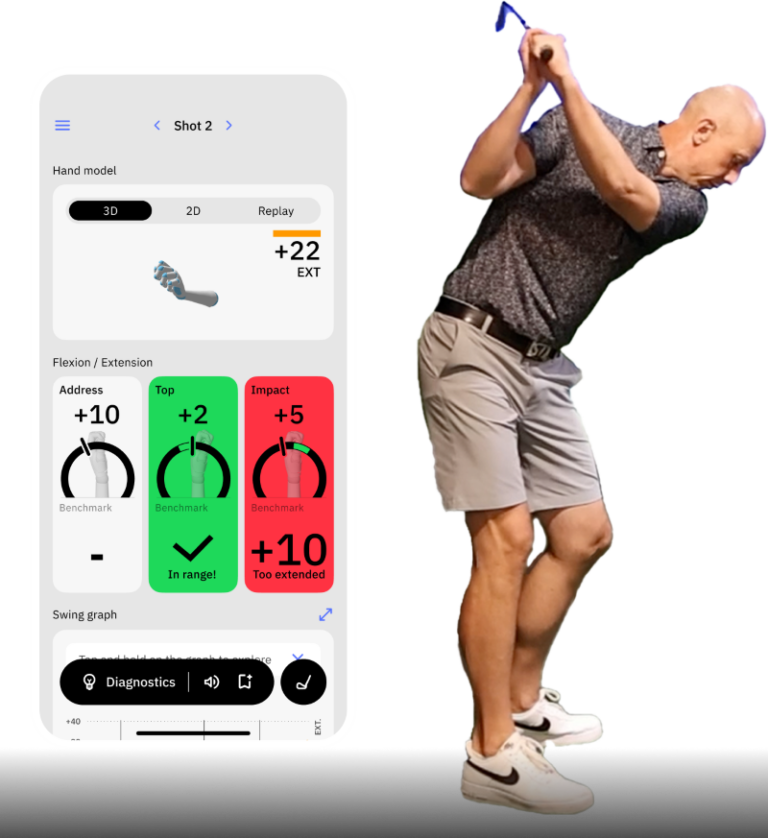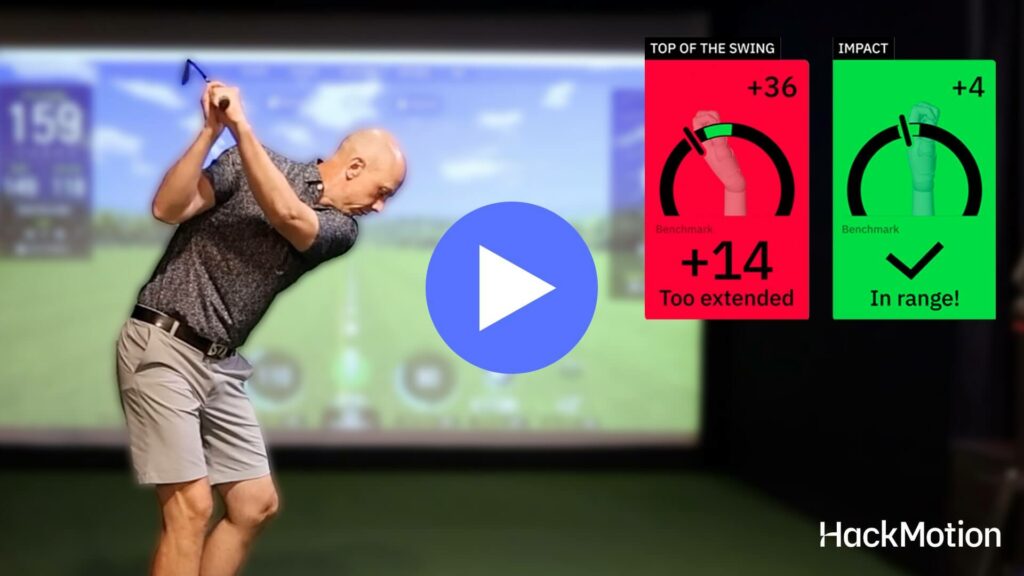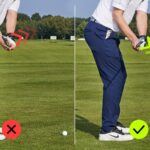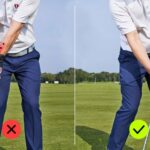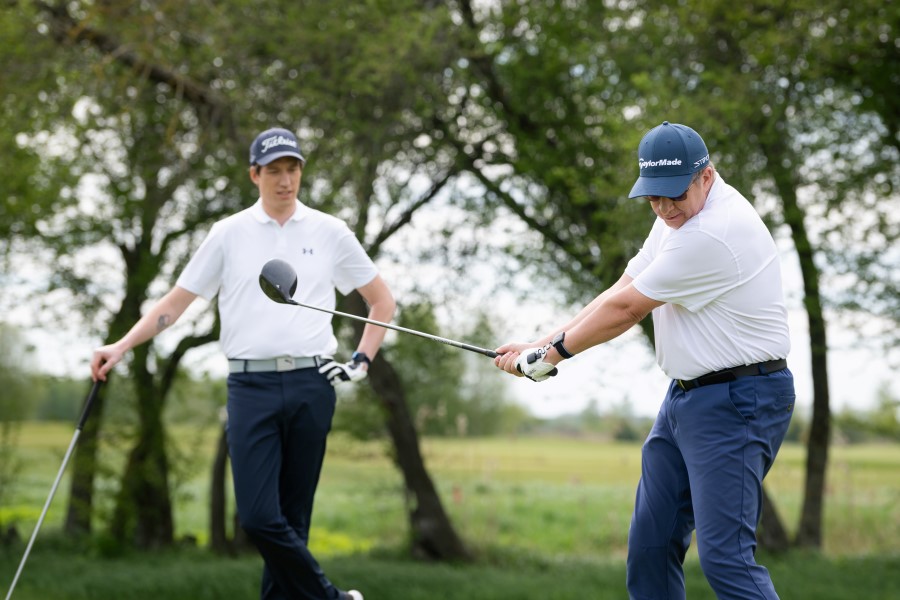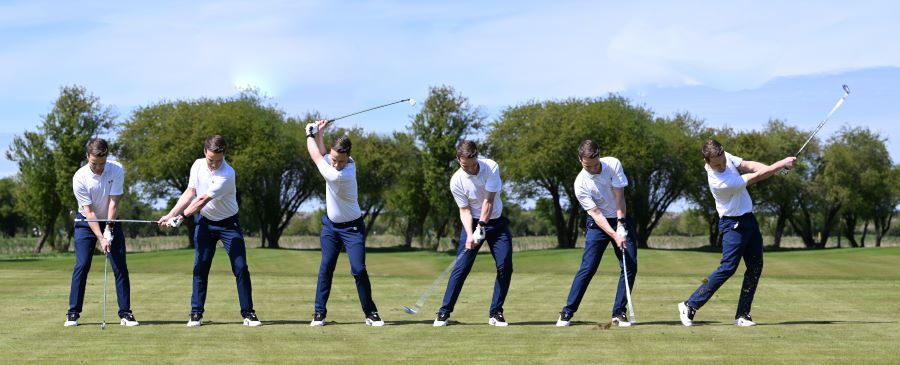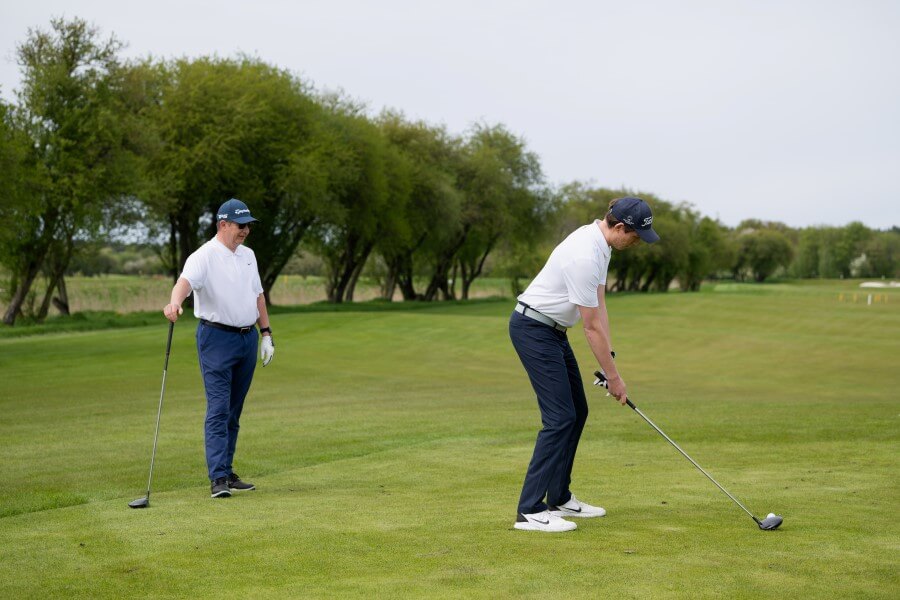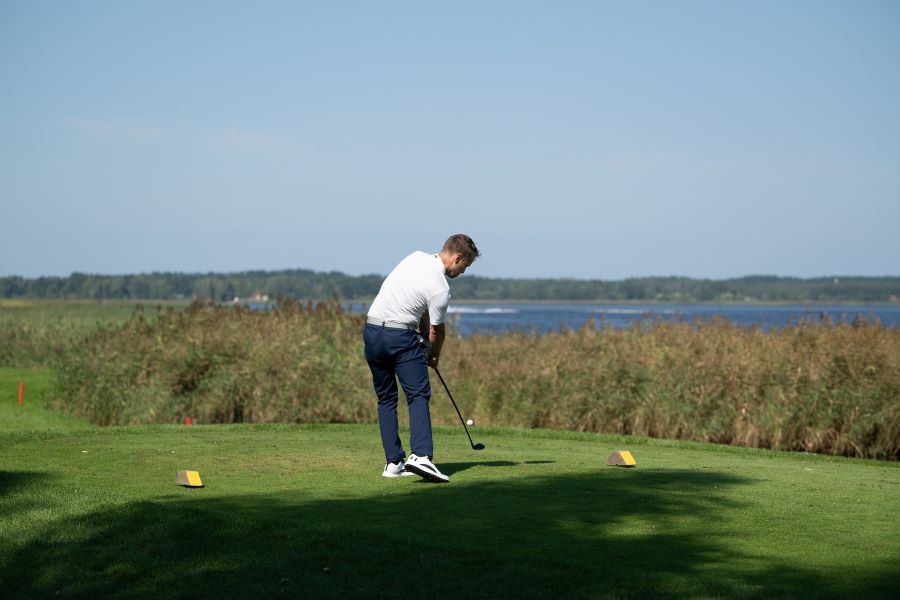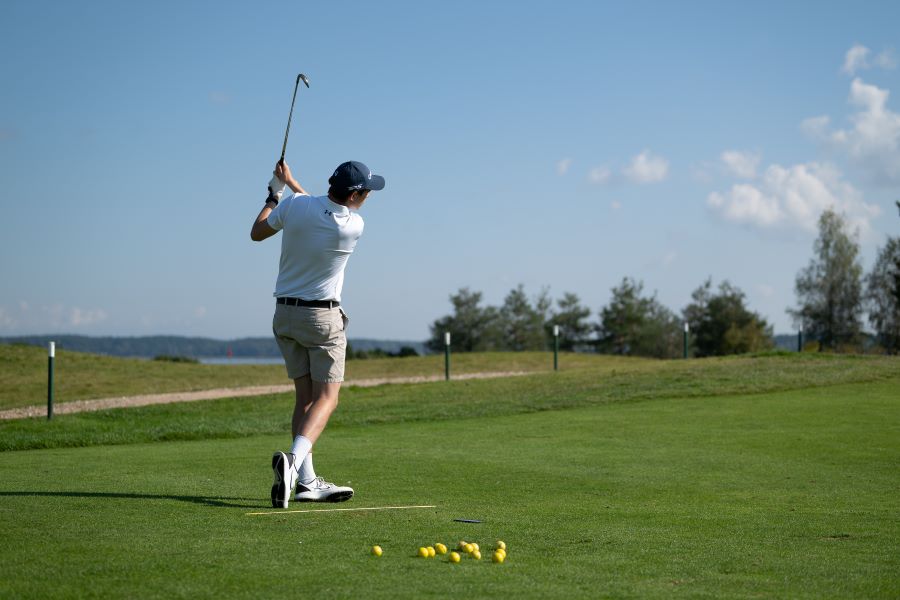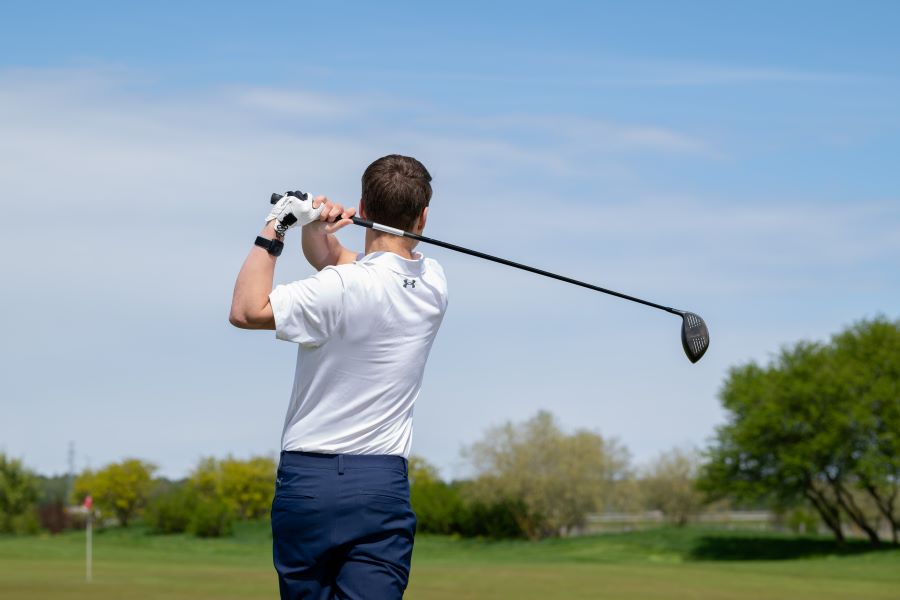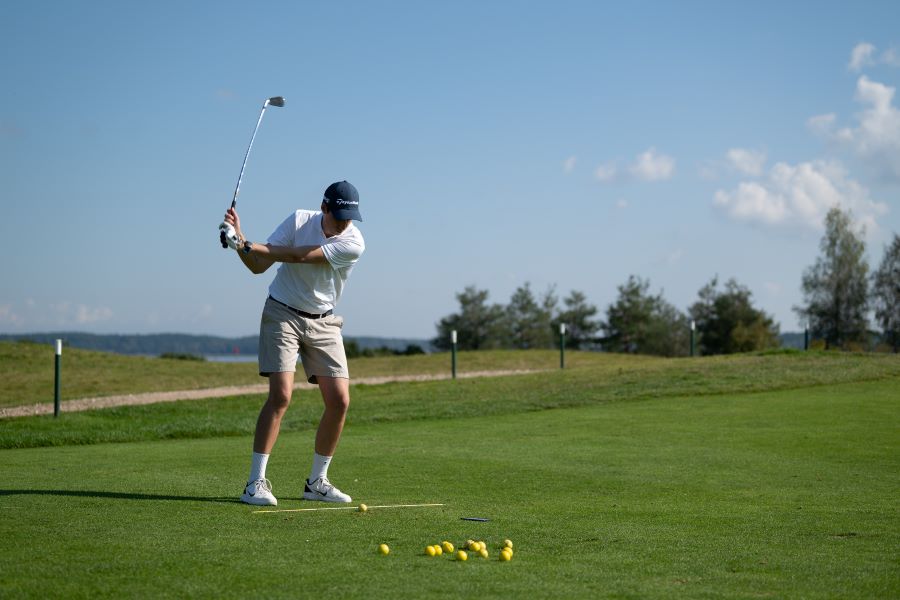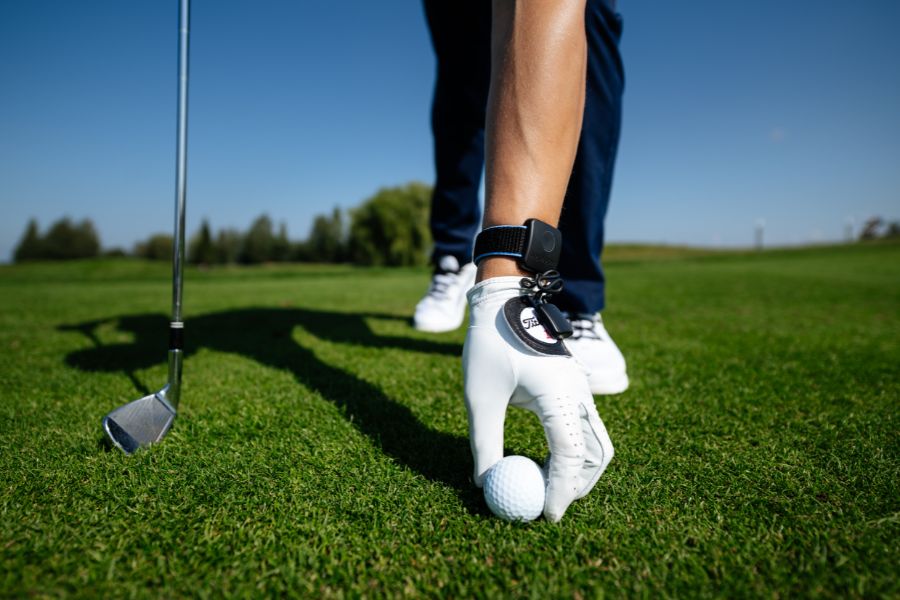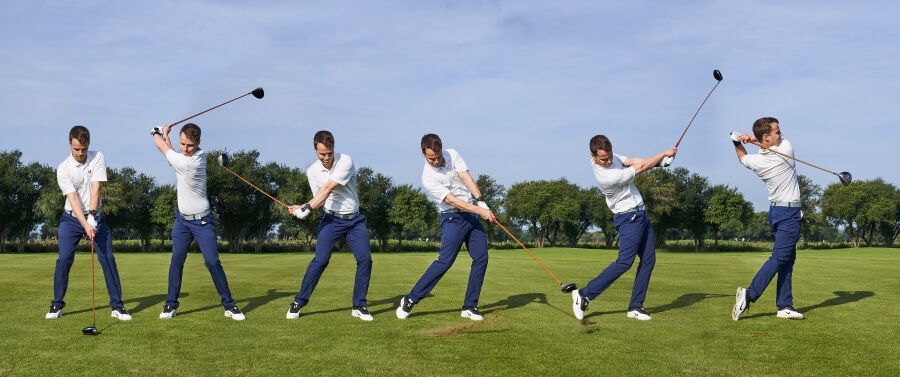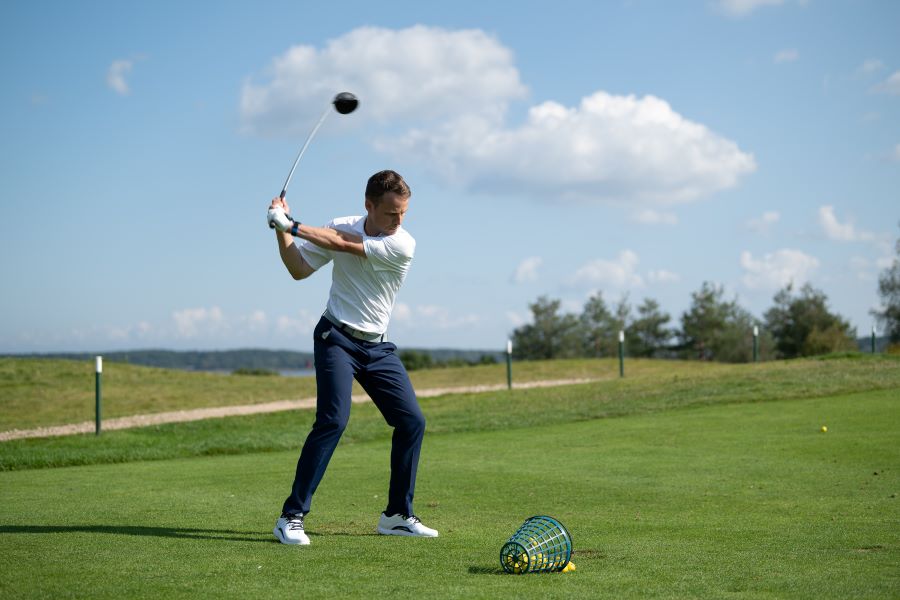How to Fix a Slice with Irons: Proven Tips & Drills to Fix It Forever
The slice is more common with the driver, but that doesn’t make the irons immune. Sometimes, an iron slice may not feel as off as the driver slice.
Even if the clubface is just a little open, the ball is going to curve. Your swing path is important, and you’ll want to get it back on track, but until you learn to control the face, shots will go right of the target.
Most golfers try to fix the slice on the spot by aiming left, swinging more shallow, or slowing their golf swing down. Those are just band-aids.
In this guide, we’ll break down what’s causing your iron slice, how to fix it, and the drills that can help you hit it straighter than ever.
How to Stop Slicing Your Irons (Key Takeaways)
If you don’t have time to read my entire guide on how to fix a slice, here are some of the key takeaways that you will need to get this motion down.
- An open clubface at impact causes the slice.
- The simple fixes are grip position and setup, work on those first and then move to more complicated fixes.
- Wrists control the clubface, get your wrist position right and your clubface will be square at impact.
- Focus more on the clubface angle than the swing path; almost all of the shot direction is controlled by the clubface angle at impact in relation to the swing path.
- Extension in the lead wrist at the top of the backswing is one of the leading causes of a slice and many golfers are unaware they are doing it.
Contents
If you prefer to walk through the process of fixing your slice by watching videos, check out our complete seven-video course on how to fix a slice.
We cover everything, including grip, wrist angles, and drills—all designed to help fix the slice with your irons. Access the free video course here!
What Causes a Slice in Golf?
A slice is caused by a clubface that is open at impact in relation to the swing path. Most golfers think that their slice is caused by their path alone. That’s not true.
If your path is a little steep, but your clubface is square, you may not see a slice but instead a fade or, for some talented players, a straight shot.
Golfers who slice the ball don’t have the clubface control they need. This lack of control causes a slice.
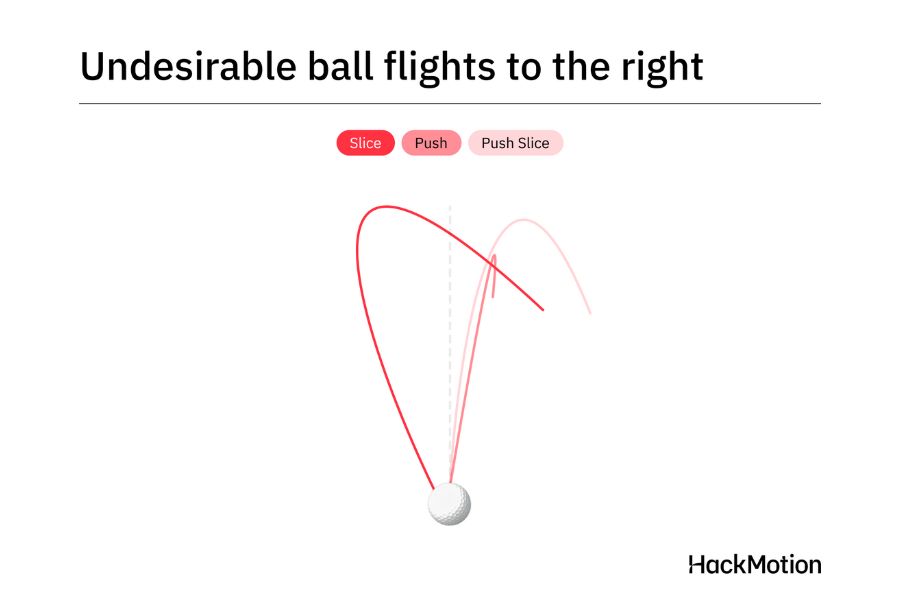
Here are a few of the reasons why you slice your irons:
- Poor grip and hand positioning specifically a grip that is too weak.
- Incorrect setup and posture with your feet on a line that is not square to the target.
- Mental misconceptions of what the golf club looks like at impact.
- Too much extension or cupping in the lead wrist at the top of the backswing.
- Failure to release the golf club and improper wrist rotation in the downswing.
- Poor weight distribution at setup with more weight on the trail side.
- Incorrect equipment with improper shafts, lie angle, and even club length can lead to a slice.
7 Simple Steps to Fix Your Slice with Irons Forever
Now, it’s time to get rid of the slice. Each of these fixes can be worked through on the range to stop slicing your irons.
Try to wear your HackMotion as you are working on your slice so you can see the correlation between clubface control and wrist action.
1. Grip Position Made Stronger or More Neutral
If the cause of your slice is related to a grip, it’s likely because your grip is too weak. Strengthening a golf grip can help correct a slice.
Start by looking at the position of your left hand. If your left hand is turned too far to the left (right-handed golfer), it is a weak position. Turning the hand just slightly more to the right can fix this.
Making a golf grip stronger will almost always feel as though you are getting your right hand to be just a little more under the club.
Word of caution here.
Golfers love to exaggerate a grip fix. If you make your grip too strong, you will hook it. Grip adjustments are small; move your hand over just a quarter to half an inch, see what it does, and then go from there.
2. Stop Aiming Down the Left
When you continue to aim down the left and try to muscle the ball so it doesn’t turn right, chances are your feet, hips, and shoulders are no longer in line. Start aiming down the middle.
Use alignment sticks to get your feet, clubface, hips, and shoulders all started on the same line, just like Rob demonstrates in the video below.
- Video Timestamp – 0:00 – 0:52
Now, your brain has some idea of what the path is and when it would be appropriate to square the clubface. Without these lines and positions, it’s kind of a guessing game.
3. Learn what Impact Feels and Looks Like
Clubface control seems foreign to many new golfers.
However, if you can learn to picture what impact looks like, you are partially on your way to hitting straighter shots.
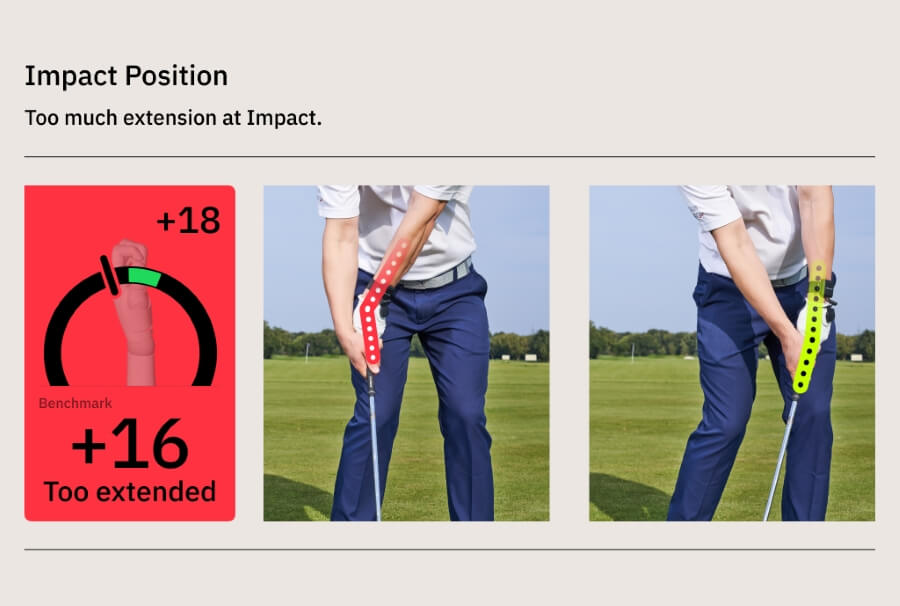
When learning to fix a slice with irons, always start with a short iron and work your way through the bag. The shorter clubs can make it a bit easier to square the clubface.
4. Use HackMotion to Fix Wrist Positioning
Did you know that the clubface on your golf clubs is controlled by your wrist position?
HackMotion is like having a coach on your wrist. It teaches you to keep your clubface a bit more closed through impact by flexing the lead wrist.
Once your clubface is square or closed (like the professionals), you can rotate your body and create more power.
HackMotion knows the wrist extension that a tour player has at the top of their swing. That same ratio and guideline are applied to you when wearing the HackMotion.
As you swing through, you can use the audio feedback feature to hear when your wrist position needs to be adjusted.
5. Stop Getting Steep
Steep golf swings are one of the most common mistakes for amateur players.
For golfers looking to fix a slice forever, a proper swing path with more of an in-to-out motion will help give you the time and the position to square things up at impact.
One of the best ways to avoid getting steep is to take the club back a little lower and slower.
Sometimes, within the first few movements of the golf swing, you are already on a steeper path, making it impossible to recover.
6. Go In for an Equipment Check Up
Having played the game of golf for 30 years, I can tell you that equipment is incredibly important.
However, for most players, the cause of the slice is not the equipment they are using.
Once a year or once every other year, go in for a club fitting where you can test equipment and compare it to your own.
Ultimately, the proper positioning of your body, wrists, and weight will help you get rid of the slice forever.
7. Push the Handle Forward and Up
One of the more common mistakes golfers make that causes a slice with the irons is keeping the hands too far back and too low.
This one simple adjustment of pushing the hands up and slightly forward can help players gain more flexion in the lead wrist at impact.
You can practice this feeling and see the relationship it has with controlling the clubface when you work on your short game. Increasing your ulnar deviation in the lead wrist can set you up to hit a draw on your next iron shot.
This video from Rob Cheney is part of a complete video guide on how to fix a slice with HackMotion. You can access the full guide here.
Essential Tips to Help You Fix Your Golf Slice
Now you have all the tools you need to stop slicing a driver and irons. The next step?
Practice! Yes, to hit a golf ball straight, you will need to practice. Here are some of our best tips to practice fixing your golf slice.
- Always use golf alignment sticks on the ground so you have an idea of what square looks like; this will avoid issues with incorrect aim, alignment, and setup.
- Wear your HackMotion. It’s like having a coach on your wrist to help you fix your slice and lower your scores.
- Learn to fix the slice in your irons first; remember, the shorter the golf club, the easier it is to square the face.
- Practice fixing your slice on a consistent schedule, one quick session at the range probably didn’t eliminate your slice forever; keep working on the slice fix, as it can take a little while before this fix works out on the golf course.
Drills to Help You Stop Slicing the Ball
Now that you have the information necessary to fix the slice, here are a few of our favorite drills to practice.
Slow Motion Swing Drill
Slow motion swings are one of the best ways to improve clubface control and fix your slice.
Add a few slow swings to your practice routine and focus on what it takes to square the clubface at impact.
You can also use the interactive element below — pause it at any point to see what each position in the swing should look like and compare it to your swing.
Gradually start to increase the speed and get the feeling down, and then when you have confidence, go back to full speed on all your swings.
Motorcycle Drill
If you struggle with an open clubface or flip at impact, the motorcycle drill encourages bowing (flexing) your lead wrist, helping square the face sooner.
The idea is to feel that motion of revving the motorcycle throttle in your lead wrist on the downswing.
This is one of the most famous wrist action drill in golf, and you can work on it in real-time using the HackMotion app.
Motorcycle Drill – Master Wrist Flexion in the Downswing
Focus on continuously adding flexion until the club reaches parallel, then smoothly complete your swing.
Inside Path Drill
The clubface being square at impact is the most critical fix for your slice. However, the path can play into this a bit, so it’s crucial to have the club on the proper path.
When practicing, take a tee and place it just outside the target line, slightly behind the ball. The goal is to hit the golf ball from this inside path and avoid hitting the tee on your downswing.
To do this properly, you must have a flatter lead wrist at the top of your backswing.
- Video Timestamp – 7:57 – 9:31
Clubface Control and Rotation Drill
Eric Cognoro talks about what it takes to become a better golfer, focusing on proper grip, wrist angle at the top, and the rotation of the arms on the way through.
All of these things can be measured with HackMotion!
However, as Eric explains, it does take time on the driving range to implement these things into your game.
Circle Swing Slice Fix
Here’s another drill from Hank Haney. Apparently, he’s worked with a lot of slicers in his career! This one shows the importance of learning how to release the club as you turn through.
Many golfers are unaware of how a club moves the correct way in the swing; this can fix it! This drill lets you think outside the box and fix it!
Clockwise Swing Drill – Step by Step:
- Clockwise Rehearsal: Make practice swings where the club works up, then drops flatter from the inside in a clockwise motion.
- Turn the Shoulders: As the club moves over your head, rotate your back to face the target.
- Release at 3 o’clock: When your hands reach waist-high, turn them over to promote a full release.
- Grip Setup: Use a strong grip (see 3 knuckles) with light pressure to encourage release.
- Blend It Together: Combine all steps into one smooth motion to produce a natural right-to-left ball flight.
FAQs
Here are a few of the most commonly asked questions about how to fix your slice.
Why do I slice my driver but not my irons?
A driver is considerably longer than an iron and, therefore, takes a little more effort and better timing to release it.
The driver slice is also quite common because of a golfer’s natural tendency to try to hit the driver far and ignore the correct positioning of the wrists.
What about the left-handed slice?
When golfers who are left-handed slice a golf ball, the ball travels straight and then makes a turn to the left. This left-handed slice is just as common as a right-handed slice and can be fixed the same way, but squaring the clubface at impact.
What is the best way to fix a slice?
The best way to fix a slice is to use HackMotion, specifically the biofeedback tool that HackMotion has created for golfers.
With HackMotion, you can fix your slice as it is happening and train your brain to get to the proper impact position.
Why do I slice when I swing hard?
When swinging hard, you often struggle to release the hands and square the clubface up. In addition, many golfers who swing hard have the club in a poor position during the takeaway.
Golfers with the correct positions and timing swing as hard as they want and still hit the ball straight.
Can a golf club fix a slice?
A golf club can make a slice less consistent or turn a slice into a fade, but as golfers, we must learn to get the club square at impact, regardless of what club is in our hands.
Can I fix a slice without a golf lesson?
A slice can be fixed without a golf lesson, using tools like HackMotion and studying the proper golf swing sequence.
Conclusion
Fixing a slice with your irons may seem like a big project, but it’s entirely possible.
Get out there and start working on squaring the clubface up. Using a personal coach that can go anywhere with you, like HackMotion, will help get you there considerably faster.
The quicker you can learn to straighten your slice, the quicker you can move to other areas of your game that need attention.
Golf progress never ends, but the slice is one of the most important hurdles to overcome.
